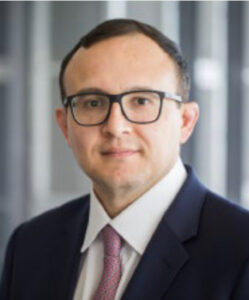In his new book Junk Food Politics, Eduardo J. Gómez argues in several countries in Latin America, leaders of the global big food companies like Coca-Cola, PepsiCo, and Nestlé have created coalitions with governments to promote food initiatives that focus on public awareness and exercise while garnering political support through contributions to government anti-hunger and anti-poverty campaigns. These companies also manipulate scientific research by working with academic allies while creating their own support bases among the poor through employment programs and community services. Gómez describes these developments in Mexico, Brazil, India, Indonesia, South Africa, and China and analyzes their impact on health.
Earlier this year Gómez discussed his book at a CUNY Urban Food Policy Forum and here Distinguished Professor of Public Health and Co-Founder and Senior Faculty Fellow at the CUNY Urban Food Policy Institute, Nick Freudenberg, interviews Gómez. Gómez is Professor and Associate Chair of the Department of Community & Population Health and Director of the Institute of Health Policy & Politics at the College of Health at Lehigh University. The book is available from Johns Hopkins University Press and other online booksellers.
NICK FREUDENBERG (NF): WHAT MADE YOU DECIDE TO WRITE JUNK FOOD POLITICS?
Eduardo Gómez (EG): My motivation for writing this book basically came from a paradoxical question. After several years of innovative non-communicable disease prevention programs in countries such as Mexico and Brazil, why did these countries continue to see a burgeoning rise in obesity and type-2 diabetes, especially among vulnerable populations, such as children and the poor? At the same time, I realized that major beverage and food corporations were very successful in manipulating research and policy. I became very curious and interested in exploring the relationship between these industries, their interests, and governments’ struggles to introduce more effective regulatory policies.
NF: YOU CHOSE TO LOOK AT POLICY RESPONSES TO UNHEALTHY FOOD PRODUCTION AT MARKETING IN SEVERAL COUNTRIES. HOW DID YOU DECIDE WHICH COUNTRIES TO INVESTIGATE?
EG: I focused on large emerging middle-income countries in Latin America, Asia, and Africa. I also chose the cases of Mexico, Brazil, India, Indonesia, China, and South Africa because they are regional leaders in the area of obesity and type-2 diabetes and some of the largest economies in their respective regions. I also chose these cases because there was a lot of data and publications on them.
NF: WHAT DID YOU LEARN FROM LOOKING AT POLICY RESPONSES AND ACTIVISM IN COUNTRIES OUTSIDE THE UNITED STATES THAT MIGHT BE RELEVANT IN THIS COUNTRY? AND IN WHAT WAYS IS THE UNITED STATES DIFFERENT?
EG: I learned that these other emerging economies are experiencing difficulties in implementing policies that focus on the root of the problem: marketing and sales regulation–as seen in the US. With respect to activism, some of these emerging economies, such as Brazil, revealed the importance of activists having formal representation within government policymaking institutions–though this is no guarantee that much-needed policies will be pursued or that existing regulatory policies enforced, as seen in Brazil. The US is different because it seems that activists have a long history of working on nutrition, food, and health-related problems, while this is still a relatively new issue in some emerging middle-income countries. It also seems that there is more financial support for NGOs and activists on these issues in the US as opposed to emerging markets.
NF: IN OUR WORK AT THE CUNY URBAN FOOD POLICY INSTITUTE, WE ARE PROMOTING THE CONCEPT AND FRAMING OF “PREDATORY MARKETING” OF UNHEALTHY FOOD, DEFINED AS THE PROMOTION OF PRODUCTS—IN THIS CASE, FOOD—KNOWN TO HARM HEALTH. WHAT DO YOU THINK ARE THE BENEFITS AND LIMITS OF THIS FRAMING?
EG: One benefit may be that breaking down this framing can lead to more questions about what industries are doing to target vulnerable groups, such as children and the poor. One disadvantage is that this frame may lead activists and researchers to overlook the responsibilities of federal and especially local governments in finding ways to regulate these marketing strategies.
NF: AS THE FIELD OF PUBLIC HEALTH DEVELOPS THE IDEA OF COMMERCIAL DETERMINANTS OF HEALTH (AS DESCRIBED IN A RECENT SERIES OF ARTICLES IN LANCET) , WHAT DO YOU THINK THOSE OF US WORKING ON THE ROLE OF THE FOOD INDUSTRY CAN CONTRIBUTE TO THIS FRAMING?
EG: We can provide more insight into how these industries are manipulating politics, policy, and society. Several social scientists are now starting to explore this issue and are providing new insights. As a political scientists doing research on this topic, however, we need A LOT more research on the advantages of applying political science theory to these issues in order to pose new questions and empirical approaches. We also need to do more work on causal mechanisms.
ABOUT THE INTERVIEWEE:

Dr. Eduardo J. Gómez is Associate Professor and the Director of the Institute of Health Policy and Politics in the College of Health at Lehigh University and author of Junk Food Politics: How Beverage and Fast Food Industries Are Reshaping Emerging Economies” (Johns Hopkins University Press, 2023). A political scientist by training, Dr. Gómez’s research focuses on the politics of global health policy, with a focus on emerging middle-income countries. He is also the author of “Geopolitics in Health: Confronting Obesity, AIDS, and Tuberculosis in the Emerging BRICS Economies” (Johns Hopkins University Press, 2018). Previously, Dr. Gómez was an Associate Professor (UK Senior Lecturer) at King’s College London, Assistant Professor at Rutgers University at Camden, and pre-doctoral visiting scientist at the Harvard School of Public Health.
